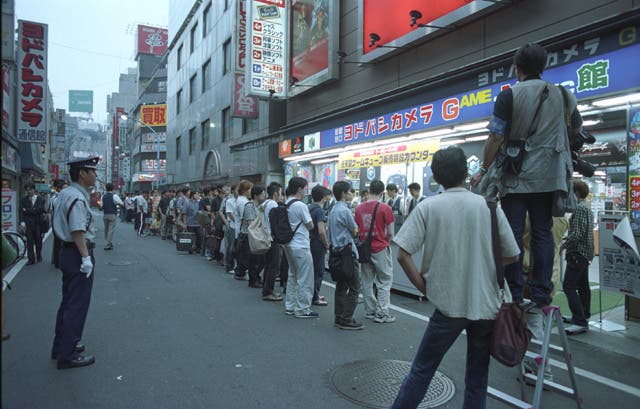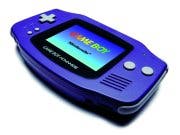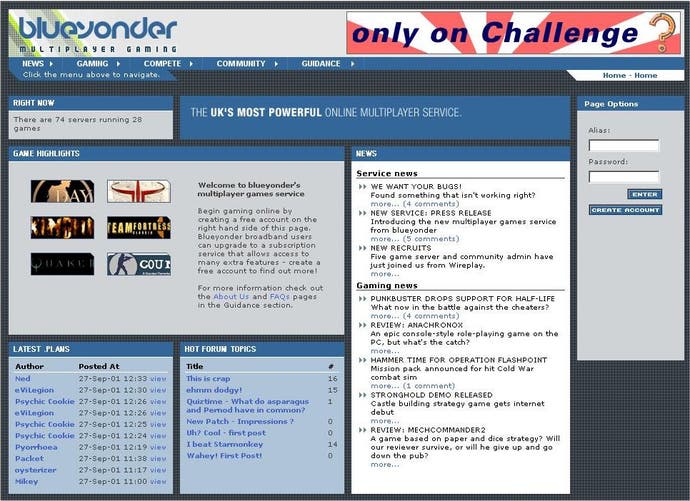The War Room
Article - we hope you enjoyed our brief stop in Japan last week, but for now it's back to the Eastern front
Nintendo's worldwide webcast this morning confirmed the European release date of May 3rd for the company's GameCube videogame console, and as rumoured the machine will cost a paltry €249, or £150 in the UK. It's the cheapest console launch ever, with the exception of the GameBoy line, and analysts have even suggested that Nintendo is actually breaking even on each unit at this extraordinarily low price, although consumers may have to wait until 2003 for a price-drop.

Cutting Costs
In order to remain competitive, many are tipping Sony to abandon its current £199 price point in favour of matching the GameCube's opening volley. With GameCube software retailing at €60 (£36), that would bring the two consoles tightly into line, although the high price of RDRAM amongst other things would continue to see Sony making a loss on hardware sales. Unless Sony Computer Entertainment America takes appropriate action though, it stands to send the yanks into a fit of despair. Sticking to its guns as it has done in the past would create an unfortunate situation where the American PS2 costs $90 more than a European one. Which would make a refreshing change. Short of cutting the price substantially both here and across the water then, Sony will have to fight to keep consumers biting. The PlayStation 2 is starting to look a little old and feeble in places compared to its competition. If things unfold as expected, there will exist an expansive gulf of difference in price between the Nintendo GameCube and Sony PlayStation 2 on the one hand and the Microsoft Xbox on the other. This could make matters even more difficult for the recently ordained Redmond-based gaming behemoth, whose Xbox console will have no chance of making any inroad on the PS2's unit sales while saddled with a price tag high enough to buy you both of its competitors. However, nobody seems keen to 'take on' the PS2…

Nintendo's Aim
Nintendo's ability to make money has long set it aside from its competitors. In the handheld gaming market it crushed all comers. As shown by SNK's castration in the last months of 2001, you can't take on the GameBoy and win. You can't even carve out a niche with funky beat 'em ups on a well-endowed handheld platform. The GameBoy Advance and GameBoy Color, apart from utterly dominating their respective markets, make more money for Nintendo than the sales of the rest of the console market put together. In the midst of all this technological doom and gloom Nintendo happily posts its profits as if nothing were the matter. Pokemon, GameBoy, even the Nintendo 64 is a financial success. Although the N64 area may be alien terrain in your local games salon, across the pond they can't get enough of it. Contradicting slightly the claims of C&VG last Friday, Nintendo will ship 500,000 GameCubes to Europe for day one, and as in the United States follow that up with regular shipments to offer a total of one million units across the vaguely defined launch 'period'. But just what is Nintendo's goal in the marketplace? Nintendo don't need to sell more consoles than Sony to make money, and with questionable third party developer support they almost certainly won't. Big, adult titles like Metal Gear Solid 2 will keep on drawing people to the PlayStation 2, while Nintendo happily stands by the turnstile keeping its books up to date as yet another plucky consumer picks up a copy of Super Franchise Squeeze 2002. In fact, Nintendo and Sony are in an interesting position. Given their relative price tags, there is scope for gamers to pick up a GameCube and a PlayStation 2. At the cost of one Xbox, it's a doorway to immeasurable gameplay satisfaction, the PlayStation 2's catalogue of stunners coupled with some of the most riveting and addictive gameplay in the known universe.
Handlebarred and Dear
In Europe at least, this paints a bleak picture for Microsoft. Marked up far beyond its competition, its superior capabilities will need to be marketed strongly. This is singularly the most painful thing about those horrific Xbox adverts and their ridiculous playmore.com website - whatever relevance they have is represented by a small green squiggly line meandering its way across a Flash animation. Congratulations Microsoft, this is definitely the most unsuccessful $500m advertising campaign we have ever encountered. If you will excuse some blunt honesty for a second, Microsoft needs to stop trying to impress people with useless gimmickery and PowerPoint-generated marketing campaigns and show people why they should buy an Xbox. While I'll freely admit to being no marketing guru, I'm on the receiving end of countless presentations and campaigns and it just makes me sick. Sell your damn console; I'm not buying a bloody handlebarred stag. Like everybody in the business, Microsoft has a long term ambition for Xbox to make a profit, but I have difficulty seeing the current approach as anything other than a monumental waste of money. Let's remind ourselves why the Xbox is remarkable. As far as gaming is concerned, it has an optimized configuration that cuts relatively few corners, and developers are already starting to produce stunning video games like Wreckless, Jet Set Radio Future and Dead or Alive 3. The Xbox also features a hard disk and network capability. Microsoft need to let people know why this is important. Sony is struggling to equal Microsoft's specification - is that not relevant to the consumer? Of course it is.

Whatever Next?
There may yet be hope for Microsoft, however. Recently Jay Allard spoke to the Financial Times and gave a few hints as to how Microsoft plans to harness the power of the Xbox in its marketing setup. Describing Xbox as "a killer application for broadband", Mr. Allard seems confident of the console's success in the Internet arena. Personally though, I'm still not convinced of the relevance of broadband gaming in 2002. It's still too expensive for the average consumer household, and is it not the remit of a games console to play games above all else? We often chastise PC games for adding online functionality as an afterthought, but the average console game isn't even there yet. Looking at it from an evolutionary standpoint, we aren't going to see much in the way of decent online console titles (with rare exceptions like Phantasy Star Online) that can compete with multiplayer PC gaming until well into 2003 at least. Betting the estate on broadband might not be quite so advisable at this point. However, the real winner in this race for console supremacy is the consumer. From May, gamers can potentially look forward to two stunning consoles at £150 a piece, each backed by an army of software titles and with the promise of broadband gaming support for both in the offing. Although we have high hopes for Microsoft's Xbox, in Europe there seems to be little room for it.
Conclusion
The console gaming market is making good on its promise to do exciting things in 2002. Already we have several possible outcomes, and the situation changes from continent to continent. We're still tipping Xbox to do better than expected in Japan, and it's obviously doing good business in the USA. When it comes to Europe though, the GameCube is the real wild card, and Sony's PlayStation 2 the thoroughbred. The solution to the puzzle will always be the same though: bang per buck. Consoles do not sell on their technological merits, they sell on the strength of their software versus the cost of the outlay. If GameCube and PS2 offer more bang-per-buck in Europe, all the creative marketing in the world stands no chance of smashing through.
-








